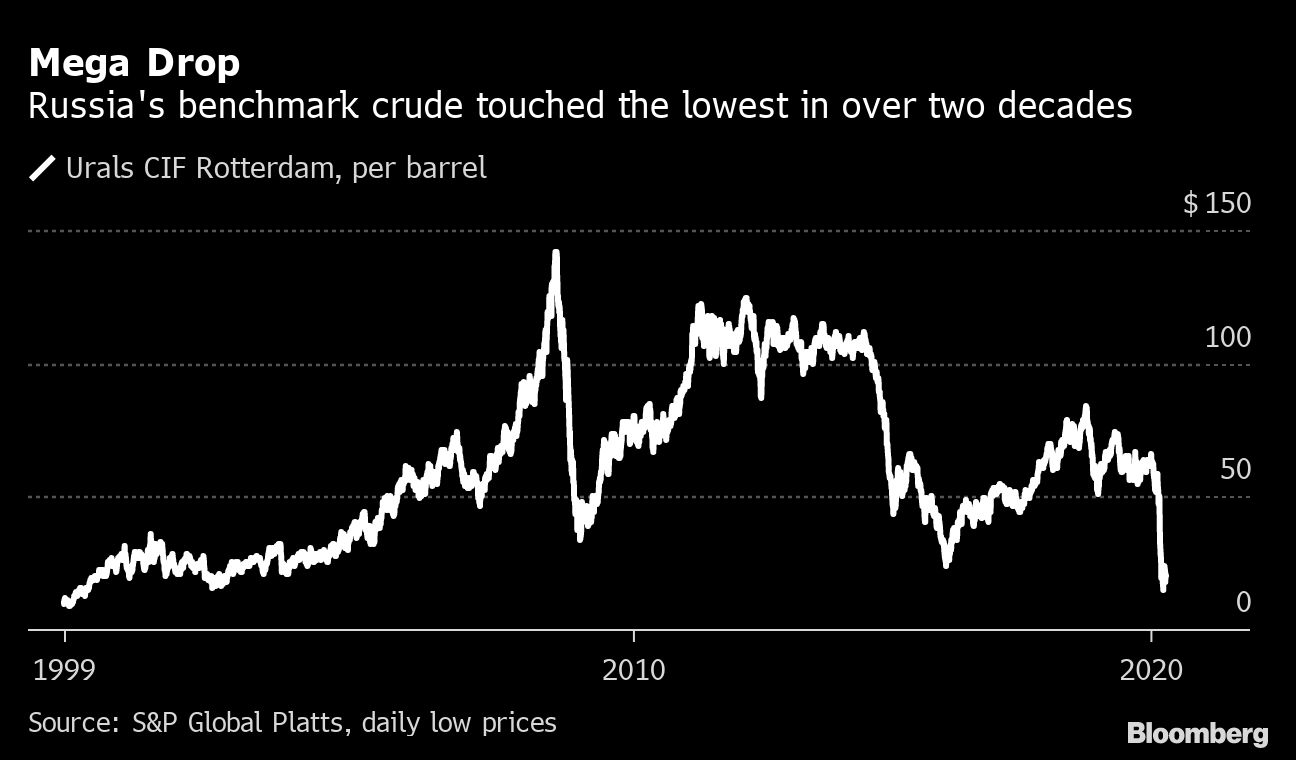No apocalypse yet, Kremlin says of crude’s collapse
Analyst predict Russia will lose around $165bn in revenue from oil and gas exports in 2020.

The Kremlin put on a brave face as prices for Russia’s benchmark crude closed in on levels last seen in a devastating 1998 financial crisis.
“The pandemonium with futures is absolutely speculative, just a trading issue,” Kremlin spokesman Dmitry Peskov told reporters Tuesday, referring to negative prices on some U.S. futures contracts. “There’s no need to give this an apocalyptic tinge.”
Keep reading
list of 4 itemsOPEC+ agrees voluntary oil production cuts
Will food prices get higher?
Iraq approves record $153bn budget aimed at creating jobs
As Peskov was talking, Brent crude, which is used to price Russia’s Urals export blend, fell to its lowest level since 2002 and the ruble plunged. The blow to budget revenues comes just as officials in the world’s biggest energy exporter were trying to figure out how to stimulate an economy battered by the fallout from coronavirus without eroding reserves.

Russia gets nearly 40% of its budget revenue from taxes on oil and gas sales and the Finance Ministry is already rewriting this year’s budget to factor in a deficit and average prices of $20 a barrel. The Kremlin is monitoring the market closely and the state has enough resources to cushion the blow, Peskov said.
“If this continues for longer then the budget will get drastically less in revenue, limiting its resources,” said Alexandra Suslina, a budget specialist at the Economic Expert Group, a Moscow think-tank that advises the government.
The ruble tumbled 2.1% Tuesday, more than any other major currency, and Russian borrowing costs jumped, with 10-year government bonds heading for their biggest one-day drop this month. Current ruble levels aren’t sustainable if oil remains here, analysts at Deutsche Bank including Christian Wietoska wrote in a research note published Tuesday.
Russia has some of the biggest foreign-currency reserves in the world, but concern about the long-term trajectory of oil prices has made policy makers cautious about spending to limit the fallout from the coronavirus. The economy could slump 5.5% this year, double the global drop, the International Monetary Fund forecast last week.
Russia will lose around $165 billion in revenue from oil and gas exports in 2020, more than in any of Russia’s recent financial crises, Nordea analyst Tatiana Evdokimova estimated. That’s around 60% of Russian oil and gas exports and a third of the total exports, she said.
What Our Economists Say:
“Whether the Urals price is negative or even $20 a barrel, it’s well below levels Russia can tolerate. Fiscal reserves can fill temporary budget holes, but the government is in a tight spot as it looks to fund a much-needed rescue of the economy.”
–Scott Johnson, Bloomberg Economics
Urals crude, the key price benchmark for the budget, hasn’t fallen into negative territory like its U.S. counterpart, according to price-reporting agency S&P Global Platts. But it did fall below $11 early this month, the lowest level since 1999, when Russia was struggling with an economic crisis, according to data from Argus Media, another pricing agency.
With prices near $20 a barrel, the budget will burn through about 2 trillion rubles ($26 billion) from the $165 billion wealth fund this year, according to Finance Minister Anton Siluanov. The Finance Ministry may increase borrowing to fund stimulus.
“This should be viewed as a temporary shock for now and Russia shouldn’t tighten the budget,” said Natalia Orlova, chief economist at Alfa-Bank in Moscow. “The economy is contracting and tightening the budget now would only intensify the scale of the decline.”